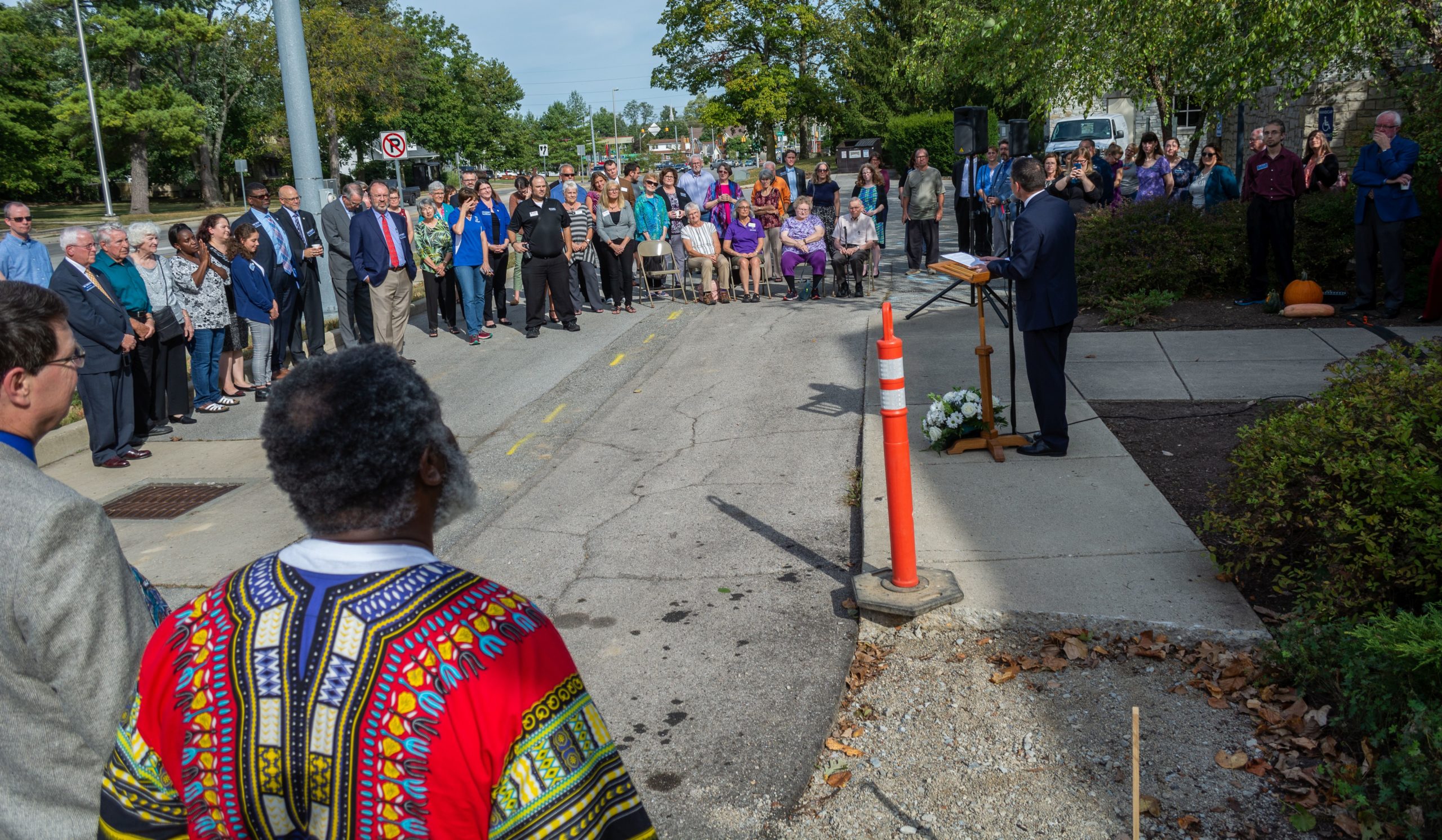
Move to Richmond, Indiana, benefits both seminary and community
Note: This story was written just before the advent of the COVID-19 pandemic. Look for updated information at the end of this story on how Bethany Theological Seminary was able to continue to serve their students during the pandemic.
By Louise Ronald
In the early 1990s, the board of directors of Bethany Theological Seminary had a tough decision to make.
Founded in Chicago by the Church of the Brethren in 1905, the seminary had moved to a large campus outside the city in Oak Brook in 1963. By 1990, maintaining that campus was no longer financially viable. Bethany was facing potential bankruptcy unless it sold the valuable suburban land and moved elsewhere.
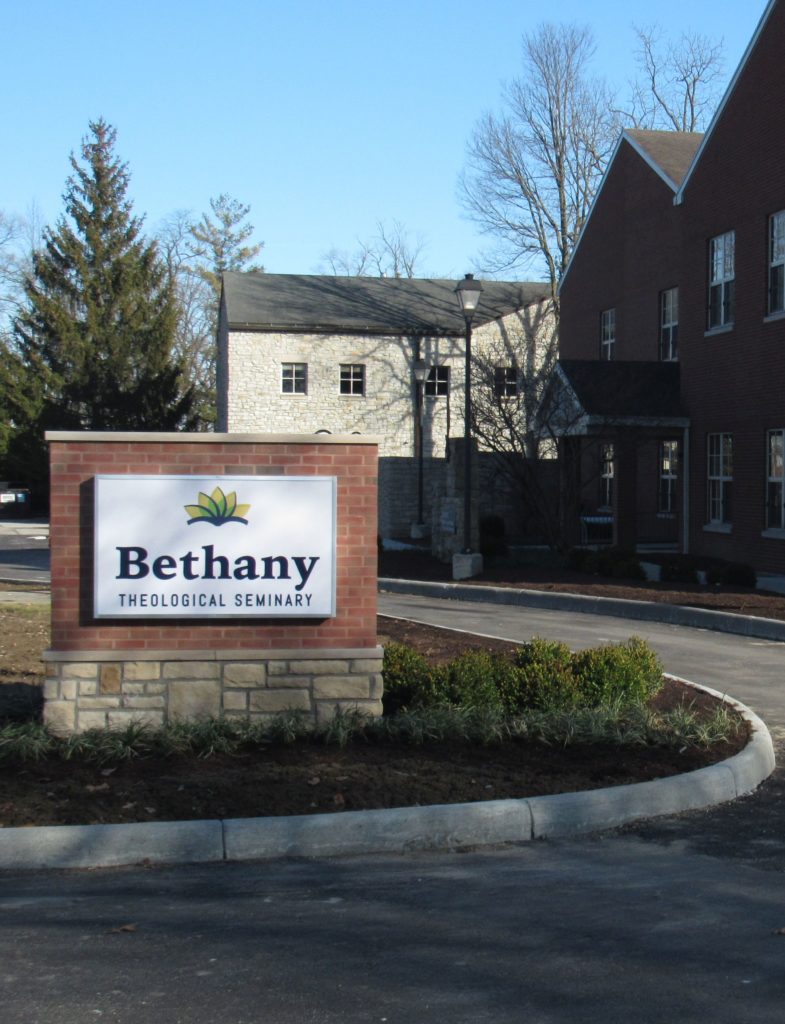
After much research and discussion, the decision was made.
Bethany would relocate in Richmond, Indiana.
Twenty-five academic years ago, in the fall of 1994, Bethany opened its new building in the northeastern corner of the campus of Earlham College, next door to the graduate programs at the Earlham School of Religion.
It turned out to be a good move, both fiscally and educationally.
“Richmond … has allowed us to continue the mission of the seminary in ways that we did not envision 25 years ago,” said Jeff Carter, Bethany president since 2013.
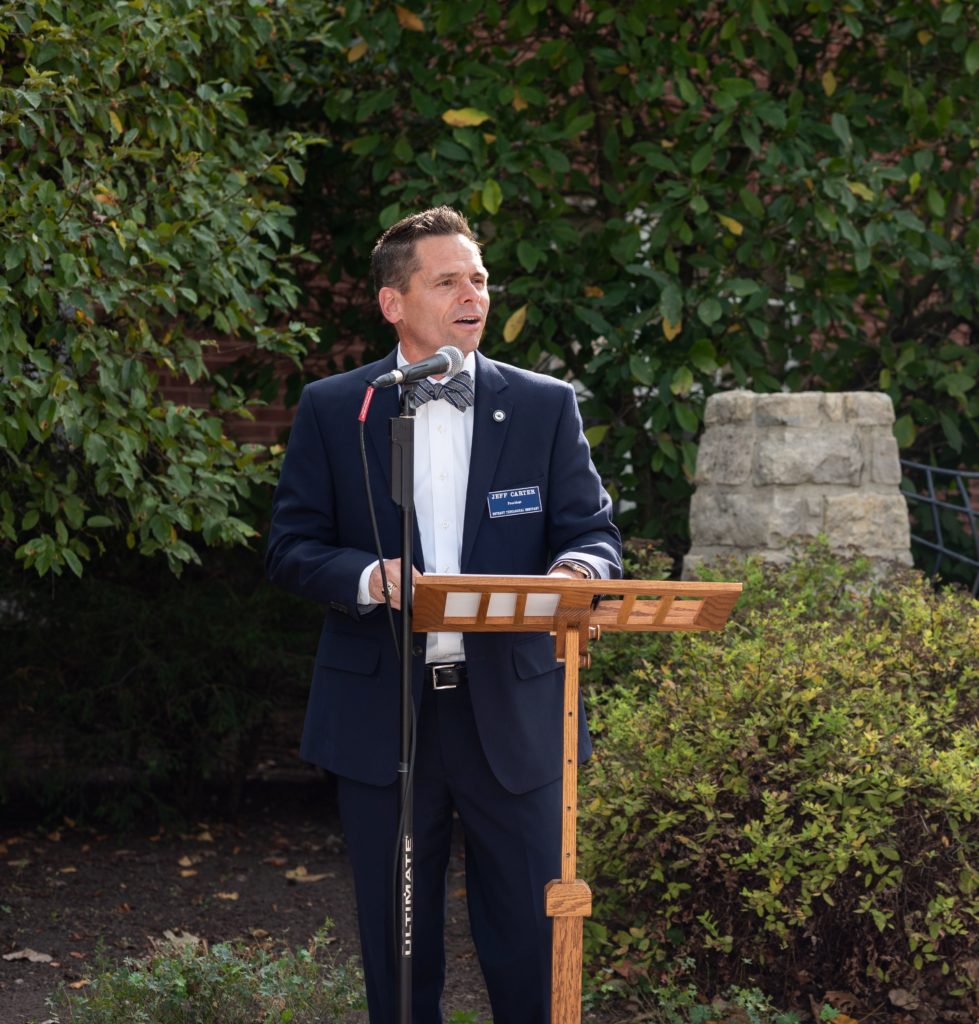
In particular, the low cost of living in Richmond and Wayne County has enabled Bethany to create a pathway for students to earn a master’s degree without going into debt. “Richmond affords us the opportunity to be generous with our students,” Carter said.
The residential students themselves also help make this possible by working 12 hours a week for the seminary, cutting institutional costs. Housing is provided in a handful of small homes on adjacent properties sharing a big back yard – all within a few minutes’ walk from the classroom building.
“We have more students than we can house right now,” said Carter.
Most small seminaries see the majority of their students enrolled in distance-learning programs. That’s true of Bethany as well. Two-thirds of its students attend electronically. Classrooms are set up so that distance-learners can participate in discussions face-to-face and in real time. Those students also participate in periodic intensive short-term classes in Richmond.
But while other small seminaries are seeing a decline in residential programs, Bethany’s is growing.
“We have flipped the model,” Carter said. “I’m convinced we can do this because we’re in Richmond, Indiana.”
Two of the students to take up residence most recently are Clarke and Hope Staton, who moved to Richmond from Staunton, Virginia, on New Year’s Day 2020.
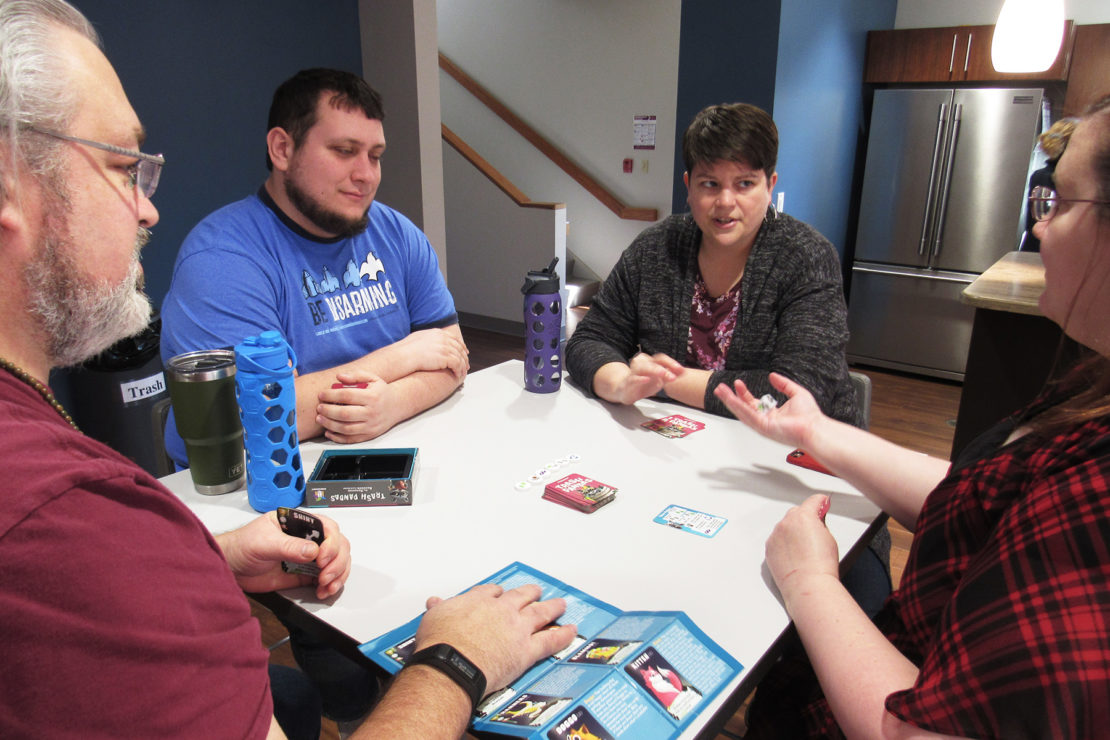
The couple had made their living as massage therapists while serving as youth coordinators at their church. Last year, Hope began as a distance-learner at Bethany. Clarke became interested in joining her, and together they decided it was time to explore a future in ministry and attend classes full-time and in person.
“Some people are gifted multi-taskers,” Hope said. “That’s not us,” said she and Clarke simultaneously.
Like the seminary itself, the Statons researched Richmond before the move, visiting in person and through several local websites. They were excited to discover the town’s jazz heritage and biking opportunities. Hope was thrilled to find a yarn store – just in case she ever has time to do anything other than study. Both were pleased to read about Richmond’s many parks.
“So many towns that are in rural settings don’t really think about parks,” said Hope. “That’s nice to see.”
In addition to their work for the seminary, residential students are expected to volunteer at least two hours a week with local non-profits. The Statons have been too busy settling in to make volunteer arrangements yet, but they’ve talked to fellow residents spending time with Richmond Community Orchestra, HELP the Animals, the Cope Environmental Center and more.
The couple is looking forward to getting similarly involved.
“Everybody’s doing something,” said Clarke. “Everybody’s really engaged.”
“It seems to me that there’s plenty to do here and a lot of reason to be here outside of the academic advantage,” Hope added.
To Carter, it’s important for residential students to practice community engagement as part of their training for their future ministry in whatever form that may take.
“The way you get involved is by serving the local community,” he said. “Our students have ready-made access to volunteer opportunities.” In addition to the organizations the Statons mentioned, Bethany students give their time to Girls Inc., Cardinal Greenway, Gateway Hunger Relief, the Model T Ford Club of America Museum and more.
But Carter doesn’t stop at recommending community involvement to students. He takes his own advice, serving as vice chair of the board for the Richmond Symphony Orchestra and as chair of the Issues and Advocacy Committee of the Wayne County Area Chamber of Commerce.
Though he came to Richmond with the intention of seeking out volunteer opportunities, Carter has found his rise to positions of leadership in only six years a bit of a surprise.
“You don’t find that everyplace, but you find it here,” he said.

Because Bethany is a relatively small school (with a total enrollment of 65 students) tucked into the corner of a much larger institution with a long history in Richmond, it has taken awhile for Richmond and Wayne County residents to become aware of the seminary. Volunteering is just one part of Carter’s conscious efforts to make Bethany more visible in the community at large.
A more concrete example is the new parking lot and sign for the seminary on National Road West. The lot, sign, and newly renovated Bethany classroom building were celebrated in September 2019 with a ribbon cutting, speeches, and exhibits.
“Bethany Theological Seminary embodies the spirit of ‘think globally and act locally,’” said Richmond Mayor Dave Snow at the event. “President Jeff Carter and his team have gone above and beyond in not only making the investment to improve their building to foster a place of learning and worship but also making it their mission to improve the neighborhood around them, thus improving our city as a whole. Richmond is fortunate to have such an amazing institution and such a passionate team.”
Carter said Bethany uses local contractors and hires local employees whenever possible. He estimates that work done to the campus last year put more than $1 million back into the community.
And that’s not to mention the people.
Some who have come to the seminary from far away have found long-term homes in Richmond/Wayne County, sometimes to their surprise.
For example, Russell Haitch was teaching in Berkeley, California, when a colleague suggested he consider applying for a position at Bethany.
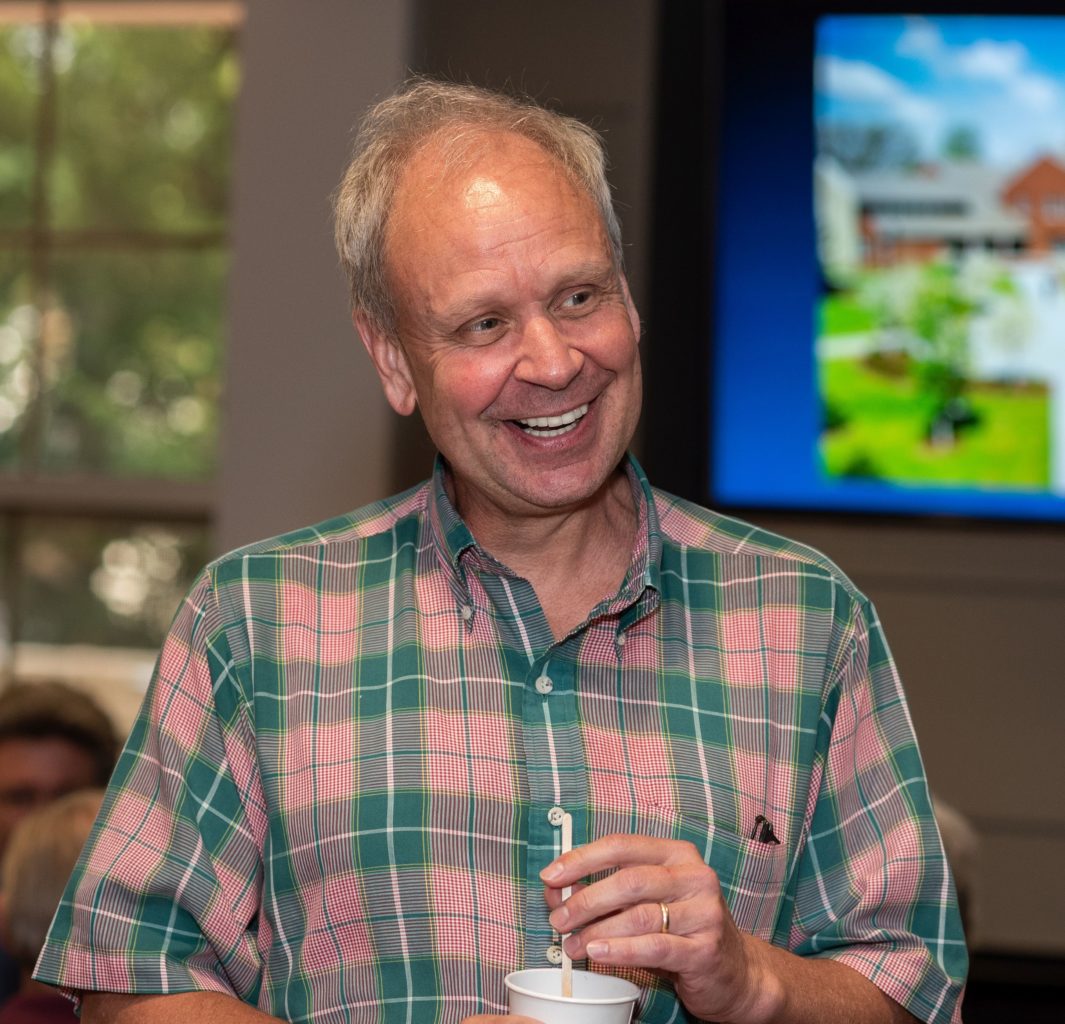
“It wasn’t love at first sight,” admitted Haitch when asked about his first impression of Richmond. “It was more like love at third or fourth sight.”
That was 17 years ago. Haitch has taught theology and human sciences at Bethany since 2003.
“The first thing that my wife and I liked about Richmond is what it didn’t have” – namely, traffic, congested parking lots, and long lines. “Because people don’t have that stress,” Haitch said, “it gives them a little more time and freedom to be friendly, to be conversational, to relate on a more human level.”
Haitch appreciates the opportunity to get to know his neighbors. “You really meet a cross section of the American population,” he said. “There’s a surprising diversity of views and conversations.”
The low cost of living benefits students and faculty as well as the institution as a whole. Haitch and his family live in a large house on a wooded lot south of town, similar to properties in the area where he grew up in New Jersey, but more affordable.
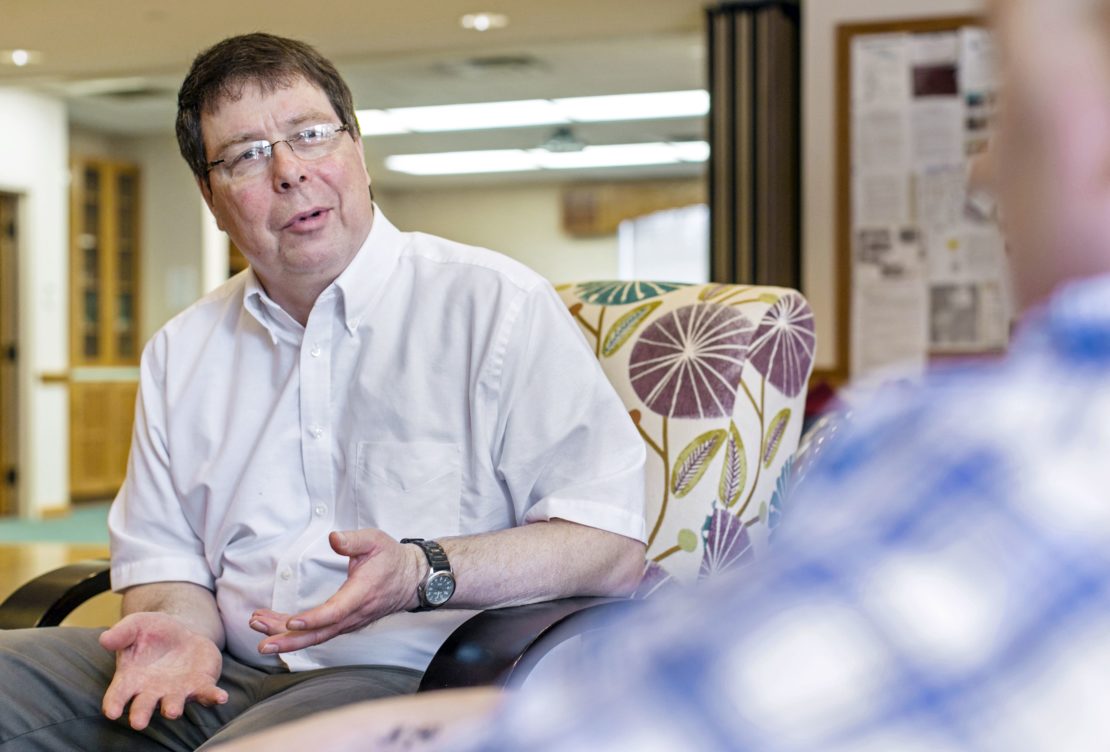
“Life is easier in a low-cost environment,” said Dan Ulrich, professor of New Testament studies since 1996.
When he, his wife, and their children first moved to Richmond, they were able to spread out in a five-bedroom house. “We had enough space for creativity,” Ulrich said.
Bethany graduate Kelly Burk never imagined making Richmond her home while she was a student resident. After finishing her degree in 1999, she took a job as a hospital chaplain in Washington, D.C. She grew up in Maryland and saw her future in that part of the country.
But it wasn’t long before a call to be pastor of the Richmond Church of the Brethren brought Burk back.
“The Midwest had kind of grabbed my heart,” she said.
Now in campus ministry at Earlham College, Burk has lived in Richmond for more than 20 years.
“Everywhere I go, I see people I know and they know me,” she said. “There’s history there. … We’re seeing each other grow and age and change.”
The relationship between Richmond/Wayne County and Bethany Theological Seminary is rather like that – the two have been able to watch one another grow and age and change over the past 25 years.
Because Bethany brings in people from around the country and around the world, Ulrich said, it creates an opportunity for engagement for the local community.
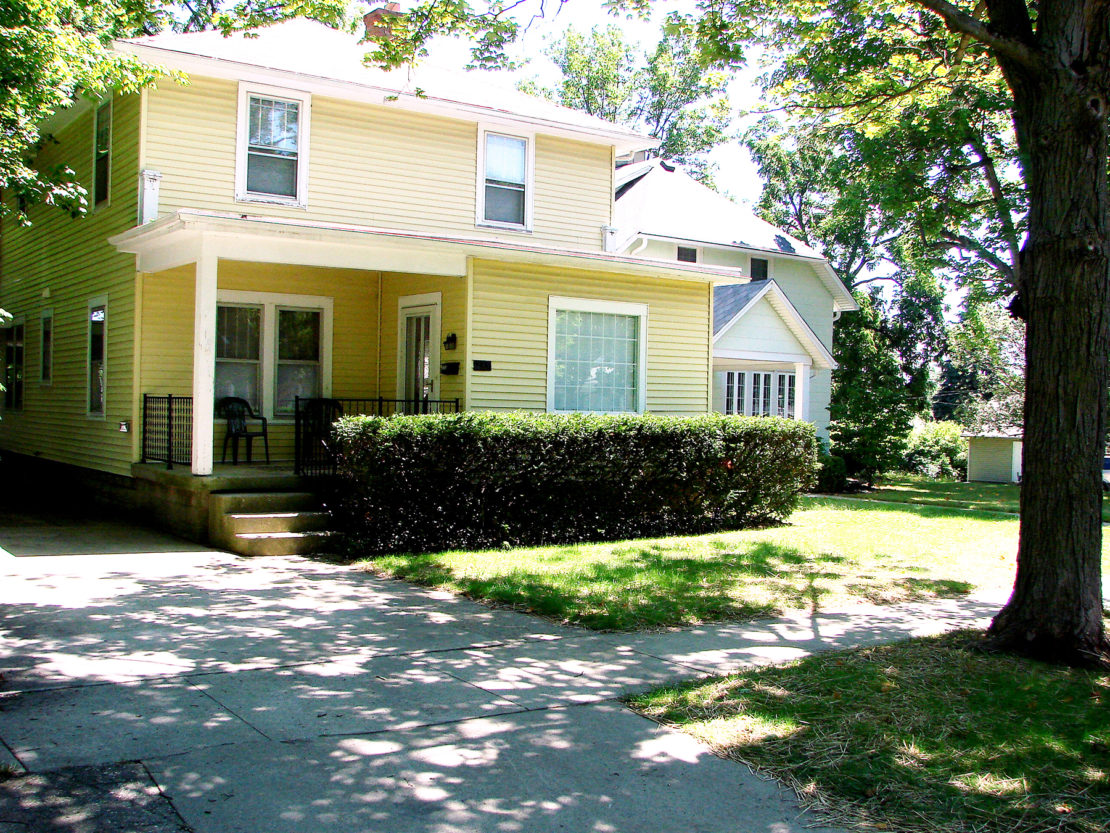
By serving as home to the seminary, “Wayne County is helping the world gain an understanding of Christian teaching, to see how Christian faith makes a difference in people’s lives, working for peace and justice in the world – that’s also an opportunity for the community to be involved,” he said.
Both as an institution and through the individual efforts of students, faculty, and staff members, Bethany is involved in “events and programs that help to make the community stronger,” said Ulrich. “We just hope that people feel welcome here.”
Learn more at www.bethanyseminary.edu.
Update: The following was provided by Bethany Theological Seminary on their COVID-19 pandemic experience.
Pandemic doesn’t slow seminary down
With the majority of its students being distance learners, Bethany Theological Seminary is well equipped for online learning. From the middle of March 2020, all courses shifted to an online-only format in response to the coronavirus pandemic.
In addition to classes, the seminary instituted two weekly online gatherings – one dedicated to devotion and prayer, the other to fellowship and information sharing.
All residential students remained in Richmond. Bethany provided daily box lunches for those students and their families, and staff (working from home) checked regularly to make sure they had all the groceries and supplies they needed.
Students near and far had regular visits from professors and the seminary’s pastoral care team. Thirteen students received degrees without ceremony and have been invited to participate in 2021 commencement exercises. Seminary President Jeff Carter joined a group of community leaders to explore ways of supporting small businesses, educational institutions, and non-profit organizations during the public health crisis.
"Since the beginning of the pandemic, the Bethany community has shown a remarkable ability to show care for one another and to adapt to unusual circumstances," says Carter on the seminary's website. "I am confident that whatever else happens, we will continue to provide an excellent education to our students."